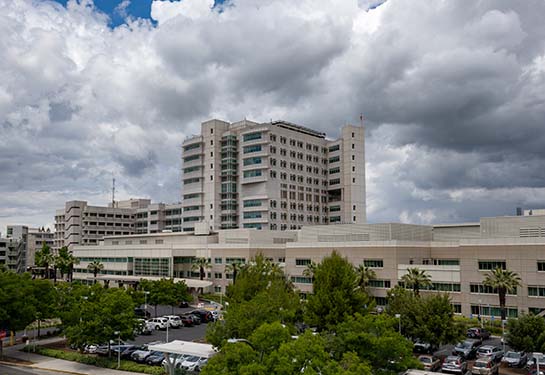UC Davis Medical Center earns national LGBTQ+ health care honors
The Human Rights Campaign Foundation has designated UC Davis Medical Center an LGBTQ+ Healthcare Equality Leader as part of the foundation’s 2022 Healthcare Equality Index report.
This is the 11th consecutive year that the group has recognized the medical center for advancing LGBTQ+ equity among its patients and employees. The Human Rights Campaign Foundation is the educational arm of the nation’s largest civil rights organization. It works to achieve equality for lesbian, gay, bisexual, transgender and queer (LGBTQ+) people.
“It is an honor to once again be named a national leader in LGBTQ+ care,” said David Lubarsky, CEO of UC Davis Health and vice chancellor for human health sciences. “Our focus on health equity means that every patient, staff member and visitor who walks through our doors is seen, heard and respected. This inclusivity is a foundational priority for us, as we embrace the uniqueness of individuals and their health needs throughout our UC Davis Health community.”
The medical center again earned a top score of 100 points by fully achieving the foundation’s criteria for excellence. It received perfect scores in the following areas:
- non-discrimination and staff training
- patient services and support
- employee benefits and policies
- patient and community engagement
- responsible citizenship
Lubarsky said, “A perfect score is great, but there are always more ways we can continue to improve while driving toward greater health equity.”
Staff at the health system’s Office for Equity, Diversity and Inclusion also emphasized the importance of addressing the health and workplace needs of LGBTQ+ patients and employees.
“In a time when LGBTQ+ people continue to experience significant barriers to civil and health rights, I am proud to be part of an organization that puts health equity at the center of what we do,” said Hendry Ton, associate vice chancellor for Health Equity, Diversity, and Inclusion. “The HRC recognition reaffirms UCDH’s deep commitment to honor and serve our LGBTQ+ patients, employees, and communities.”
Annie Caruso, chief administrative officer in the Office for Health Equity, Diversity and Inclusion, said, “The LGBTQ+ Healthcare Equality Leader designation is not only a recognition of the institution’s commitment to our LGBTQ+ community, but it also acknowledges the dedication of many staff, students, faculty and community partners devoted to ensuring that UCDH campus is a model for creating, promoting and providing inclusive clinical care services, education, policies and initiatives for all members of the LGBTQ+ community.”
Advancing health equity
For years, UC Davis has been a leader in establishing and maintaining a workplace and care environment that does not discriminate because of an individual’s sexual orientation or gender identity. On the Sacramento campus, the Vice Chancellor's LGBTQ+ Advisory Council and PRIDE - LGBTQ+ Employee Resource Group have undertaken key initiatives and raised awareness through learning opportunities and community events.
All staff are eligible for free, continuing medical education in LGBTQ+ patient care through the Human Rights Foundation. This includes more than 60 different online training options.
UC Davis Health’s Clinical Strategic Plan for 2022 through 2027 cites “advancing health equity and addressing disparities” as one of its key strategic goals. As an Anchor Institution, UC Davis Health also plays an important role in providing culturally competent care to its patients and surrounding community.
In 2013, UC Davis became the first academic health system in the nation to include sexual orientation and gender identity as standardized demographic information within its electronic health record system. Patients are encouraged to share that information because it helps clinicians provide better, more informed care for LGBTQ+ individuals.
Over the past few years, UC Davis Health has enhanced its LGBTQ+-focused employee policies and benefits. It has created comprehensive services for patients, particularly transgender individuals, and developed a resource guide for both trans patients and providers. Transgender care is now benefitting from better coordination among the different medical specialties.
A record 906 health care facilities participated in the nationwide survey, with 496 of them earning designation as a leader.




